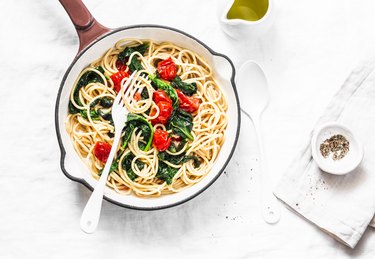
Carbohydrates are blamed for a lot of things, but when it comes to carbs and water retention, the accusation is a fair one. Eating a diet high in sugary, starchy carbs requires your body to store the extra calories. Because sugary carbs cause an insulin spike and then a resulting drop in blood sugar, eating too many carbs may keep you hungry and cause you to overeat. When you add salt into the mix — as with chips, crackers and french fries — you can basically become a walking water balloon.
Tip
Your body stores several grams of water with every gram of the glycogen from carbohydrates, so eating a high carb diet can definitely cause you to gain water weight.
Video of the Day
What Are Carbohydrates?
Carbohydrates are found in breads, pasta, cookies, crackers, grains, fruit and vegetables. The starchier and more sugary something is, the more carbs it is likely to contain. Carbohydrates in and of themselves do not make you fat, explains College of the Canyons. What causes most of the weight gain from carbs, according to the experts at Arizona State University, is eating way too many of them and pairing them with fat-laden sauces and dips. Carbohydrates are necessary for energy, but you will gain less water weight if you stick to the complex carbohydrates found in whole grains such as barley, brown rice, quinoa, oatmeal, popcorn, and whole wheat breads and pastas.
Video of the Day
Read More: Importance of Carbohydrates
Carbs and Water Retention
Carbohydrates are converted to glucose in your bloodstream, to fuel all of your basic metabolic functions and feed your brain. Some of that glucose is converted to glycogen, which can be stored in your muscles and your liver to be used immediately, according to the experts at Diabetes.co.uk.
When your body stores glycogen, it does so by binding it to water molecules at a ratio of 1 gram of glycogen to 3 to 4 grams of water, as confirmed by a 2015 study published in the European Journal of Applied Physiology. Your body stores an average of 1 pound of glycogen at any given time, which means at least 3 pounds of water. This is normal. But, your body is capable of storing more glycogen than that, which means more water.
Salt also makes you retain water. When you add in the water retained because of eating too many carbs in salt-filled snacks, you can gain several pounds in what is mostly water weight overnight.
Read More: Why Do Carbohydrates Make You Gain Weight?
Dealing With Water Weight
A certain amount of water weight is natural, according to the fitness experts at PureGym, but there are ways to ease uncomfortable bloating. One of the causes of water weight retention is starvation, so if you are on a too-strict diet or just not eating regularly, try what bodybuilders call refeeding. One day a week, take in more calories than you usually do. These should be healthy calories from vegetables and fruits, whole grains, nuts and seeds, lean proteins and healthy fats.
While most citrus juices act as a mild diuretic, simply drinking more water than usual can help you flush out the extra carbohydrate water weight. Working up a sweat can also help, as long as you make sure you don't get dehydrated.
Read More: Easiest Way to Lose Water Weight
- College of the Canyons: Carbohydrates
- Arizona State University: The Keto Diet - Is Eating More Fat the Key to Weight Loss?
- PureGym: Water Weight - What it is and Why Does it Matter
- PubMed: Relationship Between Muscle Water and Glycogen Recovery After Prolonged Exercise in the Heat in Humans
- Diabetes.co.uk: Glycogen